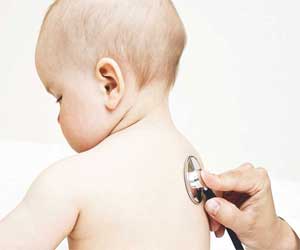- Home
- Editorial
- News
- Practice Guidelines
- Anesthesiology Guidelines
- Cancer Guidelines
- Cardiac Sciences Guidelines
- Critical Care Guidelines
- Dentistry Guidelines
- Dermatology Guidelines
- Diabetes and Endo Guidelines
- Diagnostics Guidelines
- ENT Guidelines
- Featured Practice Guidelines
- Gastroenterology Guidelines
- Geriatrics Guidelines
- Medicine Guidelines
- Nephrology Guidelines
- Neurosciences Guidelines
- Obs and Gynae Guidelines
- Ophthalmology Guidelines
- Orthopaedics Guidelines
- Paediatrics Guidelines
- Psychiatry Guidelines
- Pulmonology Guidelines
- Radiology Guidelines
- Surgery Guidelines
- Urology Guidelines
Bronchiolitis during infancy linked to 5 fold increase of respiratory illnesses later

Bronchiolitis during infancy is linked to a 3 to 5 fold increase of respiratory illnesses later.
Infants hospitalized for bronchiolitis are at higher risk for subsequent respiratory hospital admissions from asthma, wheezing and respiratory infections.
These are the findings of a recent study published in the BMJ journal Archives of Disease in Childhood, according to which one in five infants with bronchiolitis hospital admissions will have a subsequent respiratory hospital admission by age 5 years.
Bronchiolitis is a common type of chest infection that affects around one in three children in their first year of life, most commonly babies between three and six months of age. The condition causes the airways to become inflamed, triggering symptoms such as a fever, cough, and wheezing.
Helen Skirrow, Imperial College School of Public Health, London, UK, and colleagues conducted the study to estimate the risk of subsequent respiratory hospital admissions in children under 5 years in England following bronchiolitis admission in infancy. The researchers analyzed 613,377 babies (almost all births in England between April 2007—March 2008) up to the age of five years. Around 16, 000 babies were admitted to hospital with bronchiolitis before their first birthday.
Investigators used information from the Hospital Episode Statistics database detailing all admissions to National Health Service hospitals, including births.
Key findings of the study include:
- Of the original cohort, 16,288 infants had at least 1 admission for bronchiolitis within the first year of life. Of that group, 21.7% had another hospital admission for respiratory illness by age 5, compared to the 8% who did not have a previous admission.
- The association was even stronger for asthma admissions, wheezing admissions, and lower respiratory tract infections and upper respiratory tract infections.
Some limitations were the exclusion of infants born at home or in private hospitals (estimated at about 10%) and private hospital admissions for respiratory illness.
"We know that hospital admissions for bronchiolitis have been rising over recent years in England. Previous studies have suggested a link between the condition and an increased risk of conditions such as asthma, but this is the largest study to suggest a severe case of bronchiolitis can result in subsequent emergency admissions for asthma and other respiratory conditions," said Dr. Skirrow.
"An emergency hospital admission is incredibly stressful for children and their families, and also places a burden on hospitals. If we develop interventions to prevent the initial bout of bronchiolitis—we may also be able to reduce the number of subsequent emergency admissions," he further added.
Hospital admission for bronchiolitis in infancy is associated with a threefold to fivefold risk of subsequent respiratory hospital admissions from asthma, wheezing and respiratory infections. One in five infants with bronchiolitis hospital admissions will have a subsequent respiratory hospital admission by age 5 years.
For detailed study log on to http://dx.doi.org/10.1136/archdischild-2018-316317

Disclaimer: This site is primarily intended for healthcare professionals. Any content/information on this website does not replace the advice of medical and/or health professionals and should not be construed as medical/diagnostic advice/endorsement or prescription. Use of this site is subject to our terms of use, privacy policy, advertisement policy. © 2020 Minerva Medical Treatment Pvt Ltd